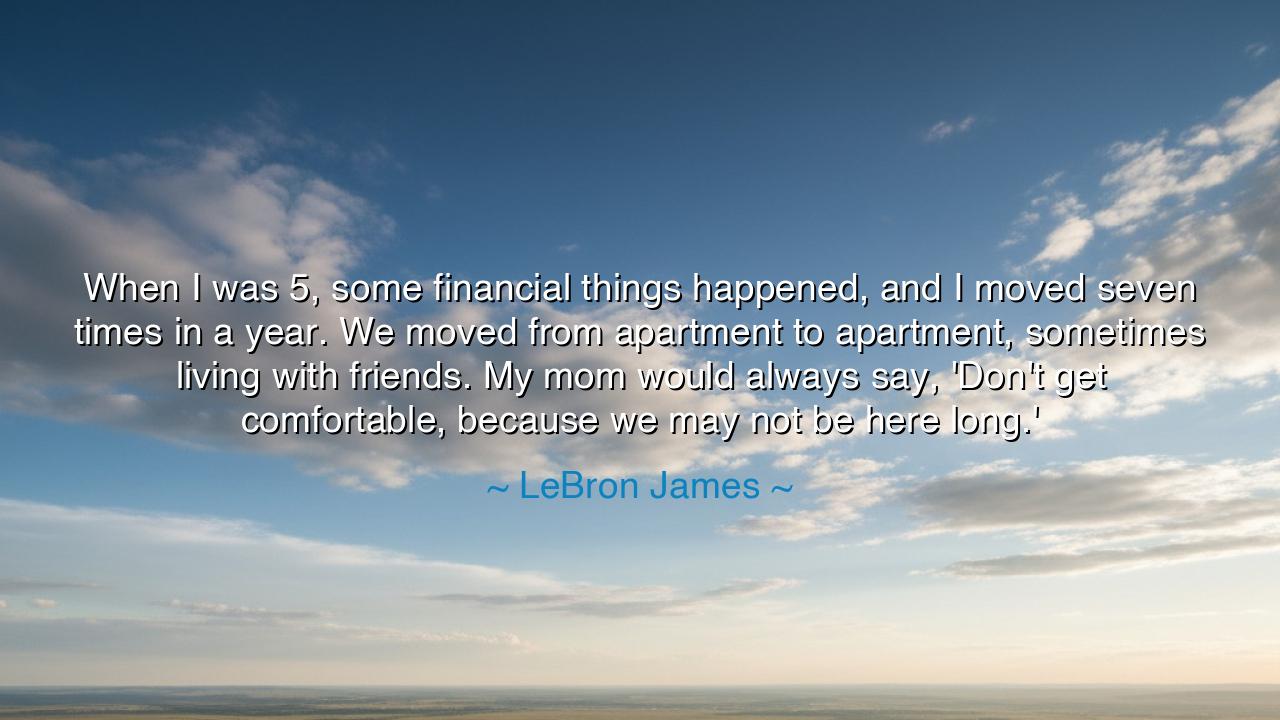
When I was 5, some financial things happened, and I moved seven
When I was 5, some financial things happened, and I moved seven times in a year. We moved from apartment to apartment, sometimes living with friends. My mom would always say, 'Don't get comfortable, because we may not be here long.'






“When I was 5, some financial things happened, and I moved seven times in a year. We moved from apartment to apartment, sometimes living with friends. My mom would always say, ‘Don’t get comfortable, because we may not be here long.’” — LeBron James
In this haunting and humble reflection, LeBron James reveals the soil from which his greatness grew — a soil of instability, resilience, and a mother’s unyielding love. His words carry the rhythm of exile and endurance, the kind of wisdom born not in comfort but in struggle. When he recalls moving “seven times in a year,” we hear not only the physical dislocation of a child but the deeper spiritual tremor that comes from having no place to rest one’s soul. Yet from this rootless beginning, something indestructible took form — a will forged in impermanence, a strength that would one day lift him above all circumstance.
To be told as a child, “Don’t get comfortable, because we may not be here long,” is to grow up knowing the world offers no guarantees — only motion, only change. The ancients knew this truth well. They called it ananke — the force of necessity, the relentless tide of fate that drives all mortal lives. But LeBron’s mother, Gloria James, transformed that necessity into endurance. Her words were not meant to steal her son’s peace but to awaken his courage. Each move, each uprooting, was an initiation — a teaching that stability is not given; it is earned. And in time, the boy who could not stay still learned how to anchor himself — not in walls, but in purpose.
In this way, LeBron’s early life mirrors the ancient tale of Odysseus, the wanderer of many homes. Odysseus too faced the endless movement of life — storms, monsters, and exile — yet through it all, he carried within him the dream of return, the memory of home. So it was with young LeBron. Though he had no single place to call home, his mother’s love gave him a compass. She could not promise permanence, but she gave him something greater: the belief that survival was possible. Out of that faith, he built his own kingdom — not of stone, but of sweat, focus, and will.
There is a sacred irony in his story. The child who was told never to get comfortable grew into a man who brought comfort and pride to millions. He built schools for children who, like him, knew the weight of uncertainty. He built homes for others because he once had none. In this, he became what the ancients called a hero of transformation — one who turns pain into purpose, and loss into legacy. His early life was not a curse; it was the shaping hand of destiny. For those who are never given ground to stand on learn instead to stand upon their own strength.
And yet, there is tenderness in his remembrance — a tribute not only to hardship but to the woman who endured it beside him. Gloria James is the quiet center of this tale, the matriarch who bore the storms and taught her son how to walk through them. When she said, “Don’t get comfortable,” she spoke not in despair, but in wisdom. She knew that comfort can breed complacency, and that a soul too easily satisfied forgets its hunger for greatness. Like the mothers of ancient heroes — Thetis to Achilles, or Olympias to Alexander — she saw in her son something that demanded fire. And so she gave him fire.
In her voice we hear the eternal teaching: that life is impermanent, but strength is enduring. The house may fall, the money may vanish, the world may change, but what is forged in the furnace of hardship cannot be undone. The ancients called this arete — the virtue of excellence that arises not from wealth, but from struggle. LeBron’s greatness is not merely athletic; it is moral. It is the greatness of one who remembers where he came from, and who builds, not for himself alone, but for those still searching for stability.
Let this be the lesson, passed down as from the elders to the young: do not curse the seasons of change, for they make you unshakable. Do not despair when life uproots you, for it is teaching you how to plant your own roots deeper still. If you are wandering, remember — you are gathering wisdom. If you are struggling, remember — you are being tempered for purpose. Like LeBron and his mother, let your hardships become your foundation.
And when you have found your place, do not forget the child you once were — the one who moved seven times in a year, who learned to carry “home” inside his own heart. For the greatest gift of all is not to find stability, but to become it for others. Thus, as the ancients would have said, the true hero is not the one who conquers the world, but the one who builds a home from nothing — and invites others to rest within it.






AAdministratorAdministrator
Welcome, honored guests. Please leave a comment, we will respond soon